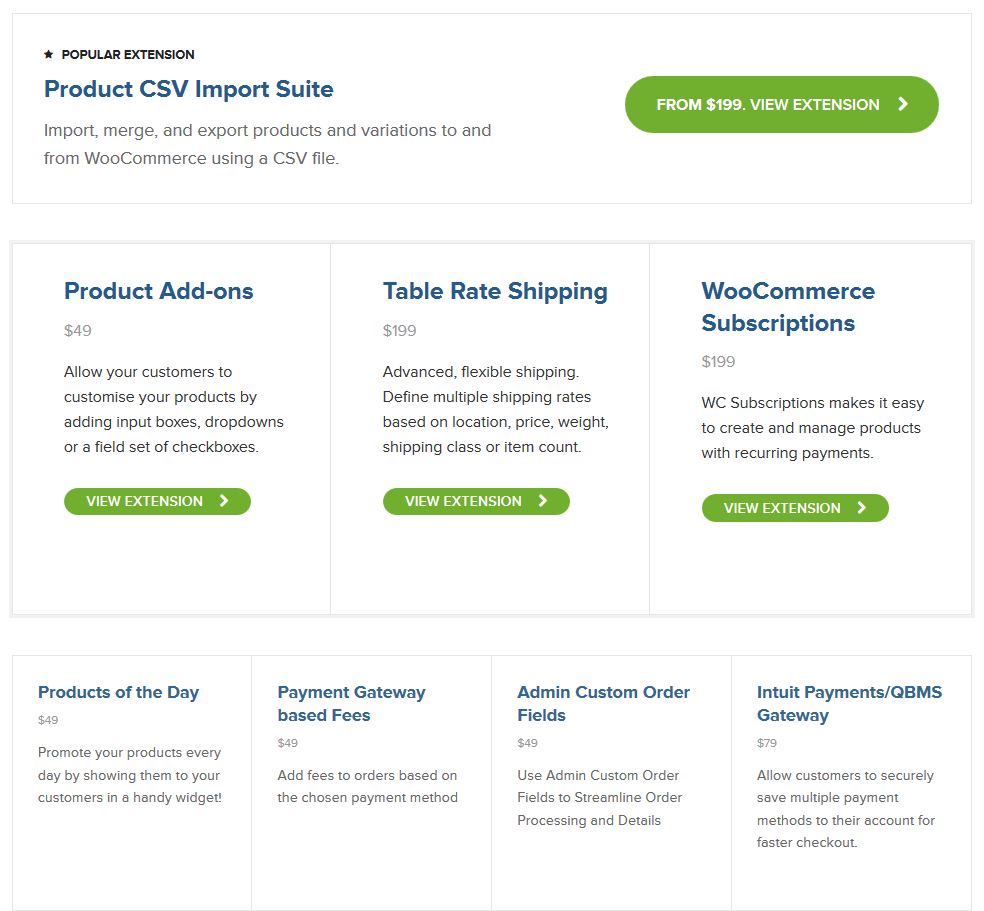WordPress has an amazing, thriving community of plugin developers, and no matter what you want to do with the website content management system, the range of available add-ons makes almost anything possible.
The only trouble is that some developers have no problem charging for extras that are not always all that “extra”. Take, for example, WooThemes and their WooCommerce shopping cart plugin.
WooCommerce is a fantastic system that generally offers a lot of the bells and whistles that people need to run a fully-featured store on their website, but it is also exactly the kind of plugin that charges for a lot of features thanks to the plugin’s extensions (yes, the plugin uses extensions–like plugins for a plugin).
Want to handle advanced shipping? The table rate shipping extension is $199. Need to handle subscriptions in your cart? That’s also $199. PDF invoices? $79.
The trouble is that at least one of those add-ons is actually a core feature that most people actually need.
Within the free plugin (and it is worth noting that the core functionality is provided as a free plugin), you can do a lot, including creating products, adding shipping charges, and you can send people to PayPal to pay for everything.
But what if you want to export your sales out of WooCommerce to analyze or even just use to file your taxes? CSV exporting is $79.
The thing is, I actually love most of what WooCommerce does. It’s a strong plugin for WordPress that is actually better than most of the alternatives, and it’s fairly easy to get it up and running, but when every little feature costs another $79, or more, I have to question if I want to support them.
WPML is one of the best systems around for translation, and for a lifetime purchase, the total fee is $195 and you get every release they put out forever. It’s a fantastic system, and it’s feature-rich.
Gravity Forms is another powerful WordPress plugin that lets you do anything you could ever want with a form, and all for the price of $199, including a year of support and updates.
By comparison, if I had to package up just a few of the important elements that are available as WooCommerce extensions, we’re easily looking at over $500 for one year of support and updates.
What really irks me though is that, when I brought this up on Twitter, Woo’s Support account chimed in suggesting that you can export sales from WooCommerce already, and not including sales exporting is actually important to keeping WooCommerce lighter:
@pgsmarketing A bit false, by default you can export to XML. http://t.co/AqIgtwW44d We try to keep the core plugin as lean as possible…
— WooThemes Support (@WooSupport) February 24, 2014
Considering they’re talking about an XML export, which contains all sorts of useless data that you don’t want in your accounting software, including orders that were never finished, and it also assumes that your accounting software can even open an XML file. I also can’t quite understand the tone the tweet takes, which seems to be a bit on the offensive, suggesting that their system does something users want, when it really, really does not.
Woo Support even went on to add:
@pgsmarketing The ability to export into other formats has been built and the dev wants to charge for their work. Like most our extensions.
— WooThemes Support (@WooSupport) February 24, 2014
The problem is that I am happy if WooThemes wants to make money off WooCommerce–because that’s what they’re in the business of doing–but I can’t swallow the idea that charging for every single feature is a bad model that follows Facebook’s incredibly flawed concept that they’re using in the news feed.
On Facebook, if you post something as a person, or on a page you manage, only a portion of your friends or fans will see that post because Facebook wants you to pay to advertise that post, thereby actually reaching the full potential audience. That’s their sales model, and it’s a terribly flawed model that makes me question even using Facebook to reach people. If there are people who have requested to get updates from my page, shouldn’t they see what I post without me paying for it?
This WooCommcerce situation is similar because all of the sales information is in front of you within the plugin, but short of writing it all down on paper, there’s no real way to use it elsewhere. That means that WooThemes is asking you to pay for the right to export the sales information that they’re effectively holding ransom for $79.
If you’re really desperate, you can at least export your sales from your payment gateway, but if you’re using the built-in option, that probably means PayPal standard, and frankly, that’s another mess that I won’t get in to here. It’s possible, but it’s not pretty.
So, what am I trying to get at with my criticism? I want to support plugin developers who are helping the community at large, and as someone who builds websites for people for a living, I want to be able to rely on plugins that work without any trouble that gets in the way. To me, this situation is incredibly greedy, and while I don’t intend to make a habit of being this critical of developers, I either have to hope that WooThemes will make some changes, or hope that other developers will step up with alternatives that make more sense.
I also wanted this post to act as a small warning for those thinking of using WooCommerce on their own sites: the plugin is powerful and effective, but if need more than the basic features, you’re going to have to pay for them.

